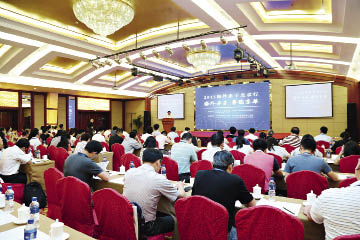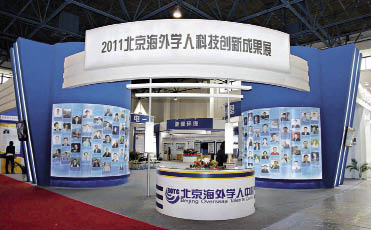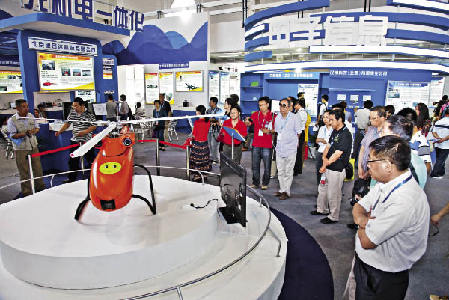Modern Talent Scout – Yuan Fang, Director of the Beijing Overseas Talents Center
FOR overseas talents who venture into starting a businesses in Beijing, Yuan Fang, director of the Beijing Overseas Talents Center (BOTC), is the “go-to” guy in times of trouble.
The BOTC, China’s first provincial-level agency for overseas talents, was established in 2008. Led by Yuan, a relaxed but fervent talent scout, the center has actively implemented the Beijing Overseas Talents Program to introduce overseas talents to Beijing. At present, the program has recruited 627 high-level experts or entrepreneurs. There are also 190 talents in Beijing chosen by the Recruitment Program of Global Experts, China’s national recruitment program of overseas Chinese experts. Since returning to Beijing, these leading scholars and entrepreneurs of various fields have made important contributions to the capital’s economic and social development.
 |
| The Beijing Forum for Overseas Talents 2015 organized by the BOTC. |
Familiar with Policy
According to Yuan, since the Chinese government launched the Recruitment Program of Global Experts in 2008, attracting overseas high-level talents has become China’s core strategy. Beijing’s local program was implemented soon afterwards to encourage overseas talents to innovate and start businesses.
Talent is the primary productive force. Beijing is regarded as China’s center for politics, culture, international exchange, and science and technology. The increasing number of overseas high-level talents who gather in Beijing is undoubtedly a tremendous boost to local development.
During the drive to attract overseas talents, the government has taken the responsibility for making policies, building platforms, and providing public services geared towards the new mode. Having participated in the drafting of interim procedures to encourage overseas high-level talents and urge overseas students to start businesses or work in Beijing, Yuan is very familiar with Beijing’s policies to attract overseas talents.
The year 2008 witnessed the opening of Beijing Summer Olympic Games, and also marked a new start in the city’s development. It confirmed a development strategy to build a “Cultural Beijing, Scientific Beijing, Green Beijing.” To achieve this goal, talent cultivation and introduction was of great importance. In 2009, Beijing took the lead in initiating the Beijing Overseas Talents Program, commonly known as the Haiju Program. It aims to introduce and support 1,000 overseas high-level talents and 10,000 competent and potential overseas students innovation or starting of businesses in Beijing over a period of five to 10 years. In May 2009, the Beijing municipal government issued related interim procedures to stipulate relevant policies for them.
What impressed Yuan was how well the policy was received by students studying overseas, who form part of its target population. “The response was tremendous. We received more than 130 calls within the first week, with people inquiring about the assessment and application process of high-level talents. This demonstrated the close attention that overseas talents pay to these policies,” said Yuan.
If identified as high-level talents, overseas talents are to be awarded RMB 1 million by the municipal government. Medical insurance, education stipends for dependents, and visa applications will be managed rapidly and conveniently to ease the process. Returnees who start a business can also apply for equivalent preferential policies. Overseas high-level talents with foreign passports who intend to live in Beijing for a long, fixed period will be issued with foreigner residence permits valid for two to five years based on the actual requirement. Permanent residence certificates can be issued to those eligible. The BOTC, as a service unit for overseas talents, will take care of all these procedures. Since June 2009, a host of returnee talents have been recruited via the BOTC, many of them chosen by the Recruitment Program of Global Experts, becoming national specially-appointed experts. Meanwhile, Beijing’s supportive policies for overseas talents are gradually gaining a reputation as a sound system and drawing attention from various branches, offering a broad space for capital technological innovation.
The city has formed a foundation of high-caliber personnel, but still wants top talents. According to Yuan, the next step is to exert greater efforts to bring in high-end talents, including leading scientists in information technology, the Internet, and basic sciences.
To achieve this goal, some related policies may have to be adjusted: talents will encounter a better policy environment and better treatment, helping them in their further research. In the future, more overseas high-level talents stand a chance of obtaining permanent Chinese residence, which will undoubtedly be good news to those who are interested.
 |
| The BOTC stand at the 2011 China Beijing International High-tech Expo. |
Talent Scouting
In recent years, the BOTC has headhunted scholars worldwide, with the aim of gathering talents, building platforms, and nurturing values.
Last December, Feng Guosheng, director general of the Beijing Municipal Administration of Hospitals, Yuan Fang, and the heads of eight municipal hospitals visited the U.S. and Canada to recruit health care personnel. The visiting delegation held four policy explanation sessions in Washington D.C., New York, Boston, and Vancouver, attracting some 280 medical specialists in attendance. They also visited Harvard Medical School, the MIT Institute for Medical Engineering and Science, and the UBC Medical School.
During the visit, the delegates ensured they were available for all who wished to talk to them at any time, which made for a very busy schedule. In one case, the recruiters were eager to meet a well-known expert who was traveling from another city. They waited until late at night for him to arrive, and when he did, Yuan sprang into action, introducing Beijing’s preferential policies. Later, when handing over the contract to him, Yuan reiterated that he would be quite welcome, no matter what he decided, to go back to China to work or even collaborate with them for a short term. Thanks to the delegates’ efforts and flexibility during the two-week visit, 15 overseas medical talents were recruited; later 50 more returned home to work.
According to Yuan, the BOTC has extensive connections with embassies and consulates, overseas expert organizations, talent exchange organizations, and overseas student organizations. On behalf of the Beijing municipal government, the BOTC has arranged visiting groups to Australia, the U.S. and the U.K. to look for overseas high-level talents.
“It is the right time to go back to work. China’s development has offered the best opportunity for you to innovate or start a business, which is a rare historic opportunity,” Yuan advises during every symposium. “Meanwhile, both the central and local governments attach great importance to overseas talents. The domestic market and financing platform are beneficial to pioneering work. Moreover, the BOTC will offer you a comprehensive service so you can leave any worries behind.”
Compared with previous years, a growing number of overseas talents have expressed their willingness to work in China. They believe that the development opportunities in China are far greater than in foreign countries. According to the latest statistics from the Ministry of Education, by the end of November 2014, about 353,000 Chinese students had returned from abroad, opting to live and work in large cities. Beijing ranks first in their destination list. According to Yuan, this is because the capital owns distinct advantages in science and technology, education, scientific research, and human resources, which are most appealing to returnees.
“After years of research, we noticed that many Chinese overseas students have started businesses in Silicon Valley. We wish to open a work station there to perform our service work on the front line,” said Yuan.
 |
| An exhibit model of the TC unmanned helicopter developed by Tang Liang, an elected member of the Beijing Overseas Talents Program and founder of Beijing Tectang Science and Technology Co., Ltd. |
Fulfill Dreams
In Yuan’s opinion, to attract overseas talents, it is important to know their requirements. “We do two things: bring them back, and help them do what they want to. And this is our duty,” said Yuan. He is always ready to offer help for returnees, and has become their trusted friend.
In Yuan’s opinion, how to integrate with local talents is the biggest problem for returnees. Cultural and conception differences require them to adapt gradually.
Du Jie now works as the assistant director of Anzhen Hospital and deputy director of the Beijing Institute of Heart, Lung, and Vascular Diseases. When he returned to work in 2008, Du had a difficult transition period. He turned to Yuan for help. Yuan advised him to have more communication with his line manager and the leaders of the hospital. Now, Du works efficiently in the hospital, and the institute where he works has obtained a national key scientific research fund. His scientific research team has published a number of high quality theses. In 2014 and 2015, Du shared his scientific research innovation experience in Beijing with other overseas talents during the Beijing Forum for Overseas Talents held by the BOTC.
An Oxford graduate, Du Jinping works on ecological agriculture research. His company, Beijing Ecoman Biotechnology Co., Ltd, encountered some difficulties on the market. Du went to Yuan for help. Yuan reassured him that it was normal to meet with difficulties in starting a business, and that perseverance prevails. Yuan told him that the market prospects for ecological agriculture were promising, and suggested he waste no time in expanding into the overseas market. Later, Du joined an African development forum in Hainan Province and found an opportunity to develop the market there. Now, the company owns an overseas experimental base. Moreover, Du’s hometown of Jingzhou, a city in central China, offered him land on which to develop biopesticides. After obtaining considerable financing, Du’s company has become a listed company. Moreover, the promotion of biopesticide technology continues to go well.
In recent years, the recruitment of overseas talents has become more competitive, creating various opportunities and challenges for the BOTC. To cope with these challenges, the organization has launched many activities to support overseas talents to innovate and start a business.
According to Yuan, along with Beijing’s socio-economic development and the collaborative development of Beijing and neighboring Tianjin and Hebei, the BOTC has invited representatives from Tianjin and Hebei to participate in the Beijing Forum for Overseas Talents to introduce their policies, offering a wider platform for overseas talents.
Since 2009, Beijing Overseas Talents Program candidates have engaged in many fields, such as biomedicine, electronic information, new material, modern agriculture, automobile R&D, finance, and cultural creativity. These talents have become leaders of these industries; their products not only fill many technical gaps, but also promote industrial upgrading. Besides, star enterprises have emerged in large numbers, such as baidu.com, Vimicro, Peacemap and LandOcean.
According to an investigation report on 150 pioneering enterprises of the Beijing Overseas Talents Program, the total sales revenue in 2013 was RMB 20.32 billion; 37 of them achieved annual sales revenue of over RMB 100 million, and 15 of them realized annual profits over RMB 50 million. These enterprises paid taxes amounting to RMB 1.73 billion, with 28 enterprises filing taxes in excess of RMB 10 million.
The dynamic capital of Beijing has become a paradise for overseas talents to put their great ideas to use and fulfill their dreams.
